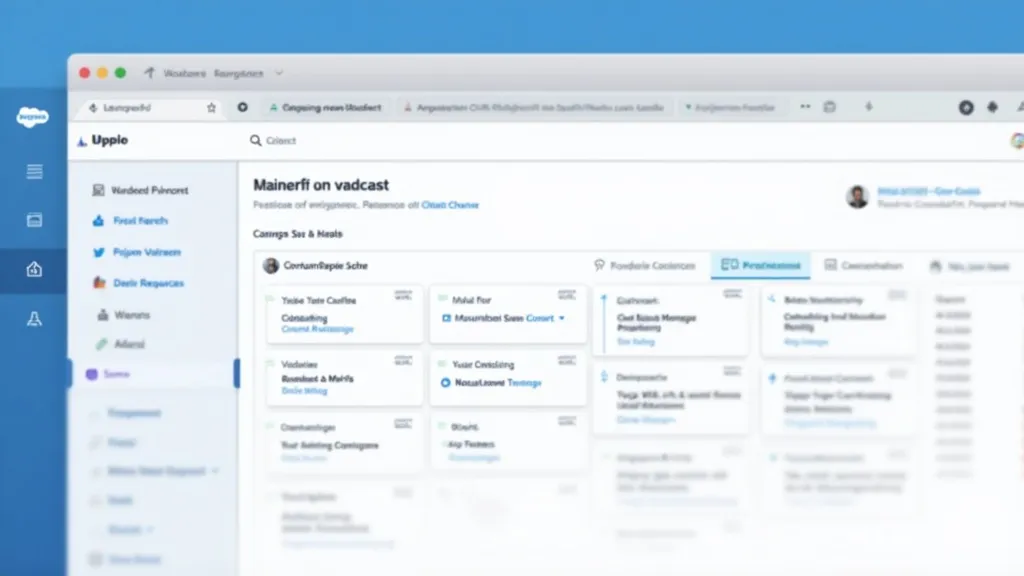Understanding Salesforce Omni-channel CRM
Salesforce Omni-channel CRM represents a fusion of customer relationship management with integrated multi-channel communication capabilities. This innovation enables businesses to track, manage, and optimize customer interactions across diverse touchpoints in a single, cohesive platform, offering a seamless customer experience while enhancing operational efficiency.

Introduction to Salesforce Omni-channel CRM
In today's fast-paced digital environment, delivering an impeccable customer experience across multiple channels isn't just a competitive advantage—it's a business imperative. Salesforce Omni-channel CRM addresses this need, providing businesses with a robust platform to seamlessly manage interactions, optimize workflows, and enhance customer satisfaction through centralized, data-driven insights. The growth of digital channels, including social media, mobile apps, chat, and traditional methods like email and phone calls, has transformed how customers engage with brands. Therefore, a unified approach to customer relationship management is essential to meet and exceed these evolving expectations.
Core Features of Salesforce Omni-channel CRM
- Unified Customer View: Aggregate data from various sources, including customer histories, preferences, and interactions, to create a comprehensive customer profile. This feature facilitates more personalized and relevant interactions, leading to higher customer engagement and satisfaction.
- Seamless Channel Integration: Integrate communications across email, phone, social media, live chat, and more into a single interface. This ensures consistent messaging and improves response times, allowing teams to manage interactions without switching between multiple platforms.
- Advanced Analytics: Utilize robust data analytics tools to track customer engagement metrics, sentiment analysis, and measure the effectiveness of different communication channels. The insights derived from these analytics can drive strategies for improving customer support and marketing efforts.
- Intelligent Routing: Automatically route customer inquiries to the most suitable agents based on availability, skill set, and context. This ensures quicker resolutions and optimizes resource allocation, helping businesses deliver timely support.
- Case Management: Efficiently manage customer cases and inquiries across channels with an organized system for tracking and resolving issues. This feature helps ensure that no queries fall through the cracks and customers receive timely follow-ups.
- Workflow Automation: Streamline repetitive tasks and processes through automation, allowing staff to focus on high-value work that requires human insight and intervention.
- Customizable Dashboards: Build tailored dashboards that provide real-time insights into customer behavior, agent performance, and overall service levels, facilitating informed decision-making.
Benefits of Implementing Salesforce Omni-channel CRM
Implementing Salesforce Omni-channel CRM offers several notable benefits for businesses:
- Enhanced Customer Engagement: By providing a unified communication platform, businesses can deliver consistent and personalized experiences that engage customers across their preferred channels. This tailored approach leads to better customer retention and brand loyalty.
- Increased Operational Efficiency: With automated workflows and intelligent routing, the CRM system reduces manual effort and accelerates service delivery. This efficiency not only improves team productivity but also enhances the overall quality of customer interactions.
- Improved Decision Making: Real-time analytics and reporting enable businesses to make data-driven decisions that enhance customer service strategies and address operational challenges. The ability to track and analyze customer interactions provides valuable insights into preferences and behavior.
- Higher Customer Satisfaction and Loyalty: A seamless customer experience leads to higher satisfaction, fostering good loyalty and advocating for the brand. Satisfied customers are more likely to recommend a business to others, contributing to brand growth.
- Informed Marketing Strategies: The analytics capabilities of Salesforce Omni-channel CRM empower marketing teams to better understand customer preferences and behaviors, leading to more effective targeting efforts and campaigns.
- Boosted Sales Opportunities: By understanding customer interactions and preferences, sales teams can identify opportunities for upselling and cross-selling, thereby increasing revenue generation significantly.
- Enhanced Collaboration: With a unified platform, different departments such as sales, marketing, and support can collaborate more effectively, ensuring that all teams are aligned toward common customer goals.
Implementing Salesforce Omni-channel CRM: A Step-by-Step Guide
| Step | Description |
|---|---|
| Assess Business Needs | Identify specific customer interaction challenges and goals your business aims to achieve with the CRM. Engage stakeholders from various departments to gather a comprehensive view of what is needed. |
| Choose the Right Plan | Select a Salesforce plan that aligns with your business requirements and budget constraints. Salesforce offers a range of options, so it's crucial to consider features that fit your needs. |
| Data Migration and Integration | Migrate existing customer data and integrate third-party applications such as email, social media tools, and more. A comprehensive assessment ensures a smooth transition of data without loss. |
| User Training | Conduct comprehensive training for employees to ensure they can effectively use all functionalities of the system. Utilize various training resources such as workshops, video tutorials, and manuals. |
| Optimize and Iterate | Regularly evaluate performance metrics and gather user feedback to refine processes and improve the system. Adapt and evolve your strategies based on insights derived from CRM analytics. |
| Monitor Customer Feedback | After implementation, continuously gather feedback from customers regarding their experiences with your service. Use this input to make further refinements and foster customer trust. |
Industry Insights and Trends
Industry trends indicate growing traction for omnichannel CRM solutions, driven by consumer demand for seamless interactions. Today’s consumers expect brands to recognize them and their preferences regardless of the channel they choose. Businesses are increasingly seeking to enrich their customer journey by deploying solutions like Salesforce Omni-channel CRM, which not only enables them to meet customer expectations but also scales their operations effectively. According to a recent Gartner report, omnichannel integration is expected to be a primary driver for CRM investments over the next decade, emphasizing the value of a connected customer experience.
Moreover, as technology advances, the integration of artificial intelligence (AI) and machine learning (ML) within CRM systems is becoming a game changer. These technologies can automate processes, predict customer behavior, and even help personalize interactions at a granular level. For example, AI can analyze previous customer interactions to suggest the best responses for agents or predict when a customer is likely to need additional support based on their activity.
Another trend reshaping the CRM landscape is the shift towards mobile-first solutions. With the surge in remote work and the on-the-go lifestyles of consumers, mobile access to CRM solutions has become paramount. Salesforce, with its mobile capabilities, allows customer service agents to assist customers anytime and anywhere, enhancing flexibility and responsiveness.
The Role of AI and Automation in Salesforce Omni-channel CRM
Salesforce Omni-channel CRM leverages artificial intelligence (AI) and automation to dramatically improve efficiency and customer satisfaction. AI features such as Einstein, which is Salesforce's in-built AI technology, provide predictive analytics that are incredibly useful for making informed operational and sales decisions.
For instance, AI can analyze vast amounts of data swiftly to determine which customer service agent might be the most effective in handling a particular client’s query based on previous interactions, improving first-call resolution rates. It also aids in lead scoring and prioritization by evaluating potential customer engagement, thus allowing sales representatives to focus on the most promising leads.
Automation plays a vital role in task management in Salesforce Omni-channel CRM. Routine tasks such as follow-up emails, reminders, and data logging can be automated to free employees from mundane tasks. This not only increases productivity but also allows staff to concentrate on high-value interactions that foster customer relationships and drive business growth.
FAQs
- What industries benefit very from Salesforce Omni-channel CRM?
Industries like retail, healthcare, finance, and telecommunications, where customer interactions are paramount, greatly benefit from such a CRM solution. For example, retail businesses can streamline their customer service operations, while healthcare can enhance patient experience and engagement through unified communication. - How does Salesforce Omni-channel CRM support remote workforces?
Its cloud-based structure and collaborative tools allow remote teams to access customer data and communicate with clients from anywhere, enhancing flexibility. Tools like Chatter and Salesforce Anywhere facilitate collaboration among teams across different locations. - Is Salesforce Omni-channel CRM scalable for small businesses?
Absolutely! Salesforce plans are designed to scale with business growth, providing small businesses with affordable entry points. The scalability option allows small enterprises to start with essential features and expand as their business needs grow. - Can Salesforce Omni-channel CRM integrate with existing systems?
Yes, Salesforce offers extensive integration capabilities with various third-party applications and in-house systems. Through APIs and built-in integrations, businesses can create a cohesive technology stack that boosts operational efficiency. - What kind of customer insights can be derived from Salesforce Omni-channel CRM?
The system enables businesses to gather insights related to customer behavior, preferences, purchasing history, and interaction history, allowing for data-driven marketing and personalized customer engagement strategies. - How can organizations measure the success of Salesforce Omni-channel CRM?
Success can be measured through a combination of key performance indicators (KPIs) such as customer satisfaction scores, resolution times, sales conversion rates, and employee efficiency metrics post-implementation.
Final Thoughts
As consumer expectations continuously evolve, leveraging Salesforce Omni-channel CRM provides businesses with the tools necessary to stay relevant and efficient. By fostering stronger customer relationships, optimizing processes, and harnessing data insights, businesses are well-positioned to thrive in an increasingly competitive landscape. Embracing a customer-centric approach backed by robust technology is no longer optional but a fundamental requirement for success in the modern marketplace.
In conclusion, the integration of Salesforce Omni-channel CRM can effectively empower businesses to understand their customers better, cater to their needs with agility, and build long-lasting relationships that contribute to sustained business growth. The ability to analyze customer interactions across various touchpoints provides invaluable insights that aid in refining not just customer engagement strategies but the overall business model as well.
In the rapidly changing digital landscape, organizations that invest in a comprehensive CRM system like Salesforce will reap the rewards of improved customer experiences, increased operational efficiencies, and enhanced decision-making capacity. The future is here, and it's connected; ensuring that your business is at the forefront of this transformation will secure its position as a market leader.










